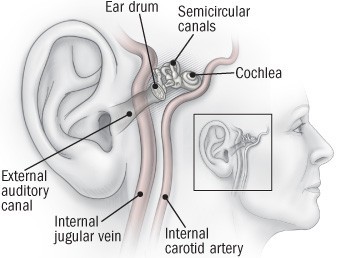Hearing your heartbeat in your ear, also known as pulsatile tinnitus, can be a disconcerting experience. While often harmless, understanding its potential causes can help alleviate anxiety and guide you towards appropriate medical advice if needed. This article explores the common reasons why you might hear your heartbeat in your ear.
Common Causes of Pulsatile Tinnitus
Pulsatile tinnitus describes the perception of a rhythmic thumping, whooshing, or pulsing sound in one or both ears, often synchronized with your heartbeat. This phenomenon arises from turbulent blood flow in the blood vessels near your ear. Several factors can contribute to this:
Conductive Hearing Loss
Conductive hearing loss, often stemming from middle ear infections, fluid buildup, or issues with the tiny bones within the ear, can amplify internal body sounds. This includes the sound of blood coursing through the carotid artery and jugular vein, major blood vessels that pass close to the ear. When normal sounds are muffled by conductive hearing loss, these usually subtle vascular sounds become more noticeable.
Carotid Artery Disease
The buildup of plaque within the carotid arteries, a condition known as atherosclerosis, can disrupt smooth blood flow. This turbulence can create a whooshing or pulsating sound that is perceived as pulsatile tinnitus.
High Blood Pressure
Elevated blood pressure forces blood through the arteries with greater force, increasing the likelihood of turbulent flow and the associated sounds in the ear. Managing blood pressure through lifestyle changes or medication can often reduce or eliminate this type of tinnitus.
Blood Vessel Disorders
Less common causes of pulsatile tinnitus include structural abnormalities in blood vessels. These can include aneurysms (weakened, bulging sections of an artery), arteriovenous malformations (abnormal connections between arteries and veins), twisted arteries, or glomus tumors (benign blood vessel tumors).
When to Seek Medical Attention
While pulsatile tinnitus is usually benign, it’s crucial to consult a doctor if:
- The pulsating sound persists for several weeks.
- The tinnitus becomes increasingly bothersome or interferes with your daily life.
- You experience other symptoms like dizziness, hearing loss, or headaches.
A medical evaluation will typically involve a thorough examination of your ears and neck, listening for unusual sounds (bruits) with a stethoscope, and potentially a hearing test. Further investigations, such as imaging studies of the blood vessels, might be necessary to rule out underlying conditions.
Conclusion
Hearing your heartbeat in your ear can be alarming, but in most cases, it’s a symptom of a relatively harmless condition. Understanding the potential causes, such as conductive hearing loss, carotid artery disease, high blood pressure, and rare blood vessel disorders, can help you address the issue effectively. Consulting a doctor for persistent or bothersome pulsatile tinnitus is crucial for accurate diagnosis and appropriate management.
